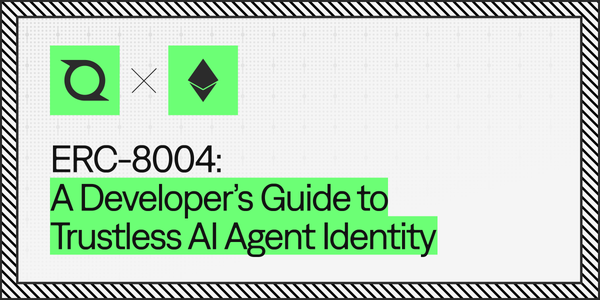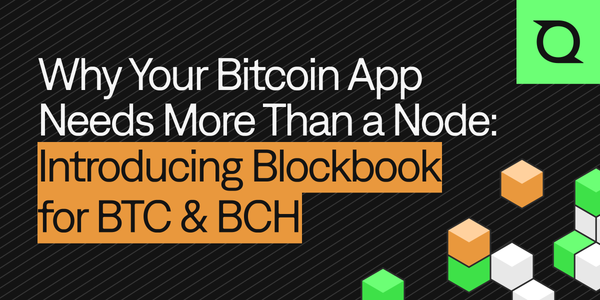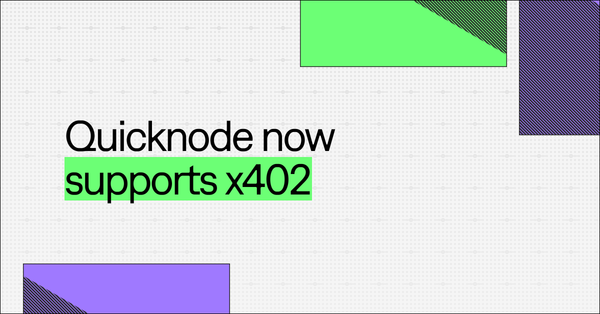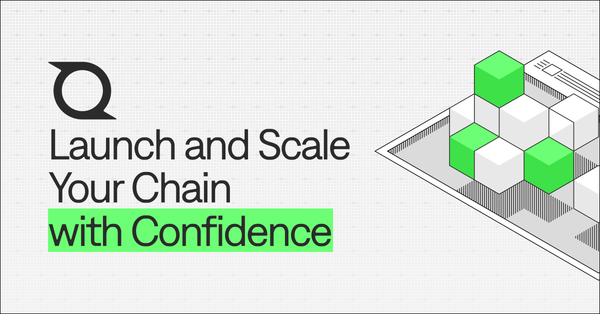A Deep-dive Into Appchains and Rollups-as-a-Service (RaaS)
Appchains are bringing composable scalability to web3 and RaaS is accelerating appchain development. Learn more.

Blockchains, especially the general-purpose ones like Ethereum, and their scalability bottlenecks are well-known. We have many solutions, from adopting rollups to offload execution to building separate blockchains with dedicated blockspace.
Amongst them all, the modularity thesis is leading the pursuit of fixing blockchain scalability.
This blog is the second installment of our dedicated series to understand the modularity thesis. The first one covered the major products of this thesis, namely appchains, sidechains, and private chains, their individual benefits, and real-life use cases.
In this edition, we will dive deeper into appchains and their execution engines i.e. rollups, before learning about rollups-as-a-service (RaaS) providers.
What are Appchains?
Appchains or application-specific blockchains are dedicated blockchains for a specific use case or application.
The appchain tech stack is modular, meaning developers have the flexibility to customize various layers in the stack to suit their application's needs. They can choose and implement their preferred consensus mechanism, execution layer, data availability solution, governance, etc.
Cosmos and Polkadot in 2016 are pioneers in the appchain thesis, prioritizing specificity and specialization over the more popular general-purpose blockchains.
This specialization leads to,
- Functional autonomy: Appchains run autonomously with self-governance and dedicated blockspace, reducing reliance on external factors.
- Reliable performance: Dedicated resources ensure consistency enabling appchains to deliver reliable performance tailored to the use cases’ demands.
- Predictable fees and costs: Appchains don’t have to compete for resources like blockspace, thereby stabilizing transaction costs and fees.
- Tailored developer experience: Appchains gives developers the flexibility to pick and choose their blockchain infrastructure.
- Improved scalability: Dedicated resources to a specific use case allow appchains to efficiently handle users and transactions, at scale.
Exploring types of appchains
Thanks to the modularity and flexibility at the disposal of developers, several types of appchains can be built, like:
Sovereign appchains
Standalone blockchains with their own consensus mechanism, operating independently without relying on a separate settlement layer.
Ex: dYdX chain, a purpose-built blockchain for the dYdX decentralized trading platform.
Hub-and-spoke appchains
Appchains that are connected to a central blockchain for security and consensus while maintaining application-specific features.
Ex: Polkadot's parachains which are connected to the Polkadot Relay Chain. Cosmos Zones which are interconnected through the Cosmos Hub.
Layered appchains
Appchains that are built on top of existing blockchain networks, inheriting security and consensus from the underlying layer.
Ex: Avalanche subnets and Polygon supernets operate as distinct appchains but utilize Avalanche and Polygon edge as their base layer.
Understanding appchain frameworks
With more appchains coming to life, major web3 players have stepped forward and launched frameworks to develop appchains on top of their infrastructure.
Arbitrum Orbit
Arbitrum Orbit is a custom-blockchain building framework to build appchains on top of their native rollups — Arbitrum Nova and Abritrum One. Orbit chains are highly customizable, allowing developers to tailor throughput, privacy, and governance, to suit specific applications.
Polygon CDK
Polygon CDK (chain development kit) is an open-source framework that enables developers to build ZK (zero-knowledge) powered layer-2 blockchains on Ethereum. All CDK-based chains have a dedicated data availability committee (DAC) to guarantee reliable and performant data access.
CDK-based chains also enjoy cross-chain compatibility, interacting seamlessly with one another.
OP Stack
The OP stack, developed by Optimism, is another appchain-building framework that enables quick-build and deployment of Ethereum layer-2 blockchains powered by optimistic rollups. Blockchains built using OP stack are interconnected within a network called the Superchain, leading to interoperability.
Each of these appchain frameworks, although in the same pursuit, differ in terms of security, flexibility, and autonomy. However, when it comes to scalability, rollups are the go-to choice. Their efficiency in handling transactions off-chain while ensuring security and data integrity is quite unparalleled currently.
QuickNode's appchain infrastructure supports zkSync Hyperchains, Polygon CDK, Arbitrum Orbits, OP Stack, and Avalanche subnets.
Rollups — the execution and scalability engines of appchains
Rollups help blockchains scale by offloading transactions outside the main chain.
They compute, verify, and execute the transactions in batches, before periodically posting the proof of execution to the main chain.
There are primarily two types of rollups:
1. Optimistic rollups process transactions assuming they are valid by default and only cross-check for fraud using fraud proofs if and when challenged.
2. Zero-knowledge (ZK) rollups use cryptographic proofs powered by zero-knowledge to validate all transactions without revealing any transactional data.
Why do developers opt for rollups in their appchain stack?
Developers looking to build appchains often turn towards rollups to handle their execution and scalability. This is because of three reasons:
- Scalability: Rollups inherently increase transaction throughput by handling computations offchain and bundling multiple transactions into a single proof.
- Economical: The off-chain computation, coupled with onchain proof submission minimizes the data stored onchain, thereby lowering the gas costs needed.
- Security: Rollups come with inherent security assurances like fraud proofs for optimistic rollups and zero-knowledge proofs for ZK-rollups.
Although rollups offer several benefits and are a go-to choice for developers and projects alike, it is not a straightforward tech to work with. The initial building and deployment of rollups demand significant technical expertise and resources. Once that’s done, the next headache is the rollup’s constant monitoring and maintenance.
What is rollups-as-a-service? RaaS overview
RaaS simplifies the development, deployment, and management of rollups by abstracting the complex rollup framework and the numerous SDKs involved. This is brought to life by RaaS providers who offer an abstraction layer to streamline the building and launch process of rollups.
This not only speeds up development but also reduces the technical and administrative costs associated with building rollups from scratch.
Using RaaS providers, developers can simply plug in rollups into their appchains and make their applications more performant and economical.
Now, why should developers consider RaaS providers?
We recognize the merit of engaging with RaaS providers while building appchains in terms of cost-saving and professional development.
On top of that, here are three key reasons why developers should consider working with RaaS providers:
Off-the-shelf solution
RaaS providers enable developers to quickly integrate rollups into their appchains, without any technical headaches, and economically. Rollups as an off-the-shelf solution mean developers can focus on their application, business logic, and user experience more, rather than building rollups from scratch.
Customization options
Decentralized sequencing, data availability options, execution frameworks, and native gas token choices are a few customization options provided by RaaS providers. Developers can truly pick and choose the stack of their preference while working with RaaS providers, helping them refine their appchain further.
Suite of integrations
Major RaaS providers offer a suite of deep integrations with providers of other components of blockchain infrastructure. From as simple as a block explorer to a full-fledged KYC-identity layer, RaaS providers offer a comprehensive suite of integrations for developers and projects to take advantage of.
What next? Choosing the right RaaS provider.
It is a critical step in the building of your project or protocol. Here are some factors to consider before choosing one:
- Technology compatibility with the existing tech stack
- Scalability infrastructure and options available
- Security features provided by default
- Cost structure or pricing model
- Ease of integration
- Customization options offered
- Ease of exit and transition i.e. data portability
Sneak peek into QuickNode’s appchain and RaaS offerings
Developers looking to build appchains and RaaS can skip all the headaches and opt for QuickNode’s appchain and RaaS frameworks.
On top of the frameworks, QuickNode offers a comprehensive suite of tools and API services that help developers and complement the building of custom chains.
Here are a few capabilities that QuickNode’s tooling infrastructure unlocks for developers:
Support to multiple chains
QuickNode supports nearly 32 blockchains and all the major appchain frameworks like Polygon CDK, zkSync ZK Stack, Avalanche Subnets, OP Stack, and Arbitrum Orbits. Alongside, QuickNode's infrastructure promotes interoperability via cross-chain bridges and protocols.
Robust RPC infrastructure
QuickNode provides a robust remote procedure call (RPC) infrastructure that ensures stable and efficient communication between different blockchain networks. This is critical for developers to build highly-performant and responsive applications.
With ~100% uptime across networks, developers have a reliable source for data and transaction processing.
Flexibility in development
Appchain inherently allows for flexible customization. QuickNode furthers it by enabling developers to define chain parameters, gas fees, and governance models. This gives complete control over the blockchain performance and behavior to the developers.
Service integrations
QuickNode’s RaaS model facilitates easy integration with a variety of infrastructure elements like decentralized storage and data streams. Developers can plug-in these components into their applications easily, leading to massive savings in time and resources.
Custom scalability
Rollups are designed for custom scalability, enabling developers to adjust the resource allocation and operation priorities, as per the demand. This means developers have more control over the application's performance, helping them deliver more predictable and reliable output.
Future of modular blockchains, appchains, and RaaS
Modular blockchains bring about specificity in the web3 space and appchains are leading the charge in realizing the potential of specificity. Performant and specialized blockchains i.e. appchains are where the industry will continue to gravitate towards, especially as numerous use cases and edge cases come up every day.
Appchains and their lightweight infrastructure will make them the ideal onboarding points for traditional companies looking to experiment with web3. Interoperability in value transfer and communication between appchains will be a major unlock for the industry, as a whole.
The emergence of RaaS providers will further accelerate the adoption of appchains and rollups, thereby improving the overall scalability of web3.
Ready to bring your blockchain vision to life? QuickNode offers the ultimate platform for building custom, scalable blockchains with zero infrastructure stress. Our fully managed, dedicated chains provide the foundation for innovation, supporting leading protocols like Polygon CDK, zkSync ZK Stack, and more. With QuickNode's battle-tested infrastructure, including advanced block explorer, validator tools, and scalable RPC, you can focus on creating exceptional user experiences while we handle the technical heavy lifting. Launch your blockchain project with ease and confidence, backed by 24/7 support and a suite of developer-friendly tools.
If you’re curious about getting started on Appchains, get in touch with us here 👇
About QuickNode
QuickNode is building infrastructure to support the future of Web3. Since 2017, we've worked with hundreds of developers and companies, helping scale dApps and providing high-performance access to 30+ blockchains. Subscribe to our newsletter for more content like this, and stay in the loop with what's happening in Web3!





